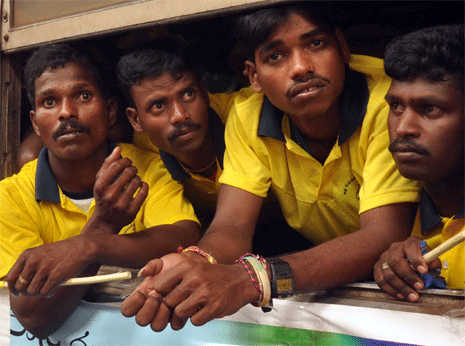
Today in Geneva, Sri Lanka will appear before the 19th regular session of the UN Human Rights Council to answer lingering questions about rights abuses in the country. Two reports, one by an expert panel appointed by the UN secretary general and another by the government-appointed Lessons Learned and Reconciliation Commission (LLRC), have addressed grave violations of international humanitarian and human rights laws, causes of conflict, the need to strengthen civilian administration, access to information, media freedom, transparency in detention and access to detainees, among other issues. At a recent meeting of human rights defenders in Sri Lanka, I met a war widow in Mannar diocese. She said her husband had been killed in crossfire during the civil war and her eldest son was taken by combatants. Since his capture, she has had no news of him. She earns a meager living through fishing and struggles to provide for her two daughters in a makeshift shanty house. She asked the council whether she and others in the country could really say they enjoy freedom of movement, and whether they could ever expect to have a home of their own and land to sustain them. Against this backdrop of frustrated hopes and the denial of basic rights, the rights commission will convene in Geneva. We in Sri Lanka can see for ourselves the truth of the findings in the LLRC report, particularly the challenges facing minority communities, and we take some comfort in the fact that the commission despite its drawbacks has perceived the denial of rights to people in the North and East of the country. Questions have persisted in recent years about accountability regarding the conduct of war during decades of civil strife, but the mediation of friendly states has prevented the passage of any UN resolution. Fears remain that similar intervention would block any such moves during today’s meeting. The civil war ended in May 2009, and the UN secretary general during a visit a few days later first raised the possibility of an inquiry into alleged war crimes. During the conflict, the international press was prohibited from visiting war-affected areas, and the Red Cross was prevented from monitoring conditions on the ground. In the final weeks of the conflict, it was impossible to guarantee the safety of civilians or injured combatants. Meanwhile, the Tamil diaspora and international NGOs condemned what they said were grave rights violations. The local press hailed the conflict as a humanitarian exercise to save civilian Tamils from what they called the cruelest terrorist group in the world. Government soldiers were hailed as heroes, and journalists quickly dismissed any talk of war crimes, torture and disappearances. President Mahinda Rajapakse, who rejected an impartial UN inquiry, instead appointed a local commission to conduct investigations and make recommendations. However, respect for human rights and a commitment to defend them remains minimal in the country. Even Sri Lanka’s National Human Rights Commission has been criticized for non-compliance with international standards. The UN secretary general appointed its own panel of experts to evaluate the rights situation in Sri Lanka without collaboration from the government. The three-member panel began its research in September 2010 and soon recorded six allegations against the LTTE and five against government troops. The government quickly rejected the UN findings. This rejection of independent findings has remained consistent. The government also rejected claims of war crimes by government soldiers made in a documentary by Britain’s Channel 4. The government said video footage was “doctored” by Tamils and NGOs and aimed merely to deface the good image of the country. Despite the shortcomings of the government’s LLRC report, it does contain some relevant information, in which the government is criticized for the non-implementation of interim recommendations. Some credit should be given to the 8-member panel that produced the report for their decision to listen to the stories of those who lived through the conflict and their subsequent condemnation of current rights violations in the country. The panel apportioned blame to all political parties for their “inability or unwillingness” to resolve minority rights issues. “The Commission takes the view that the root causes of the ethnic conflict in Sri Lanka lies in the failure of successive governments to address the genuine grievances of the Tamil people,” the LLRC report states. The report includes 285 recommendations, most of which could be seen as stepping stones for resolving national disputes and some of which were contributed by religious leaders seeking the establishment of interreligious groups to help resolve conflicts. As the LLRC will play a part in discussions today in Geneva, there is a greater challenge to see the report’s recommendations implemented. Most Sri Lankans are unaware of the detailed reports by national and international rights groups. Moreover, there are almost no impartial or human rights-based discussions in the local press, as any difference of opinion from that of the government is considered unpatriotic or pro-LTTE. It is the task of religious leaders to educate people about the truth of matters regarding the problems of minorities and their suffering. The theme of Lent this year for Catholics is “Unity through Reconciliation.” This is perhaps the right occasion to educate society about the recommendations of the LLRC, which are aimed at reconciliation. And perhaps the meeting in Geneva will provide the right motivation for such discussions. Fr Reid Shelton Fernando is a university lecturer and coordinator of the Young Christian Workers Movement who submitted research on disappeared priests to the LLRC last year


